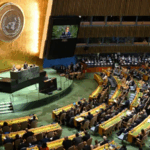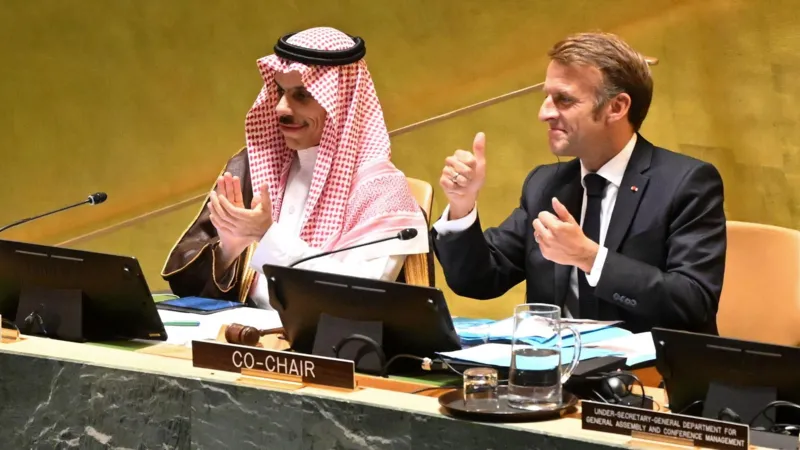
Britain and France’s recognition of a state of Palestine at the United Nations is a historic moment in the century-old Israeli-Palestinian conflict.
But it is also a diplomatic gamble illustrating how major European powers believe the conflict has reached a point of existential nihilism requiring them to take such an unprecedented move.
Faced with the current catastrophe in Gaza, and meting out condemnation for both Israel and Hamas, French President Emmanuel Macron said “right must prevail over might”.
His move, coordinated with the UK and under Saudi sponsorship, is meant to keep the two-state solution on life support.
They believe this long-held international formula for peace is the only path to a fair, shared future for the two societies.
The alternative, UN Secretary General António Guterres told a UN conference in New York, was a “one-state” solution, meaning Israeli domination and the “subjugation” of Palestinians.
Nothing, he said, could justify their collective punishment, starvation or any form of ethnic cleansing.
Israel is furious and is threatening to respond.
It sees the UN conference – along with recognition of a Palestinian state by the UK, France, Canada, Australia and others – as a reward for Hamas after its attack on Israel and its hostage taking of 7 October 2023.
Some Israeli ministers want the response to be an announcement of annexation of parts of the occupied West Bank, forever ruling out a viable Palestinian state on the territory.
Prime Minister Benjamin Netanyahu’s governing coalition, including far-right figures whose avowed policy is to expel Palestinians and build Jewish settlements in their place, is intent on pulling the plug on a two-state solution.
President Donald Trump’s administration continues to back its Israeli ally, rejecting the Europeans’ move, punishing Palestinian Authority (PA) President Mahmoud Abbas.
It barred him from attending the conference in New York and he spoke via video link instead.
The Palestine conference and the Trump administration’s reaction marks the deepest ever split between Washington and its European allies over how to solve the Middle East conflict.
But the Europeans believe they have been left with little choice given the situation on the ground.
Israel is now deploying a third army division into Gaza City, with dozens of Palestinians being killed every day; Hamas continues to hold nearly 50 hostages, many of them dead; while the West Bank is in the grip of Israeli settlement expansion and settler violence.
All this nearly two years on from the 7 October attacks, with few signs that further military pressure will force the surrender by Hamas that Israel seeks.
Macron’s strategy is an attempt to show that diplomacy offers a viable alternative.
First to get a workable end to the war in Gaza, followed by a longer term solution in the form of two states – Israeli and Palestinian.
The European countries argue Israel’s strategy has failed, resulting only in further civilian suffering and endangering the remaining hostages.
Crucially, the UN conference was also led by Saudi Arabia and supported by the Arab League.
The French argue this shows its form of diplomacy can exert leverage over Hamas because key Arab countries at the conference have now called on the group to disarm, hand its weapons to the PA, adding it can have no future leadership role for Palestinians.
Macron believes the process therefore creates an incentive for Israel, while it also keeps the door open to a normalisation of relations with Saudi Arabia – a long desired goal for Netanyahu and Trump.

But the decision to recognise a Palestinian state against the wishes of Washington amounts to a significant diplomatic gamble.
Watching Macron at the podium in front of the United Nations, you saw a president trying to take on a global leadership role to find a way out of the “nightmare” of Gaza, as the UN secretary general put it, and find a shared Israeli-Palestinian future.
But, speaking in terms of raw power, this was the wrong president.
Without the US leading the effort, there isn’t the same kind of meaningful pressure that only Washington can bring to bear on all sides.
And the Trump administration continues to reject the Europeans’ approach.
Trump travels to the UN on Tuesday where he will speak and later reportedly meet Arab leaders, entirely separately from their work with the Europeans on Monday.
This lack of co-ordination between key countries adds to the sense of dysfunction, while Qatar as the previous mediator between Israel and Hamas still refuses to become involved again after Israel attacked Hamas leaders on its soil earlier this month.
Both Macron and Starmer brought up their countries’ colonial legacies in the Middle East.
They recalled how, after Britain pulled out of historical Palestine in 1948, the international community recognised the state of Israel.
Now, they said, they were recognising the equal right of Palestinians to their own state.
Palestinians welcome their recognition from the Europeans nations, but they also know these are the superpowers of the past.
Their decisions don’t count like they once did.
Palestinian statehood only becomes feasible if it’s backed by the superpower of today, the United States.
And President Trump so far has other ideas.